Tag: living a bigger life
Dream Big, They Said
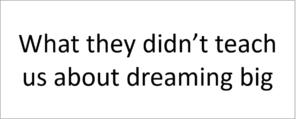 Remember when we were little kids and we were told we could do anything we set our minds to? We heard it mostly in grade school, but also in after-school programs and from parents.
Remember when we were little kids and we were told we could do anything we set our minds to? We heard it mostly in grade school, but also in after-school programs and from parents.
We were told inspiring accounts of people who achieved great things. We learned of career options from astronaut to president and told we could have those jobs. We were taught about Mother Theresa and Martin Luther King Jr and told we too could do big work with a big impact that helped many people.
We were told to dream and work hard. We could do great things in our lives. We just had to make up our minds and go for it.
Teachers and the others – they can’t very well NOT say those things. Where would we be if we hadn’t been told to have dreams and try to reach them?
I wish, though, that we had been taught what to do when things go wrong in our pursuit of our big dreams. And what to do when life squishes our dreams before we even really attempt to achieve them.
I think it happens as early as high school – when we trade in our grand ideas for more practical matters. Our awareness grows. We understand what we hear on the news and its implications in our own lives…jobs and joblessness, natural disasters, war…
There are also timelines to consider. Preparing for the first job out of high school, or attempting to get into college and then deciding what to study. And then graduating and needing a job and a place to live.
After college I wasn’t dreaming much. I enjoyed my life and dove into the beginning of my career, but looking back, I can say my dreams were replaced by goals.
And my goals – at least the biggest two that I accomplished in my adult life so far – didn’t even come from a strong desire within myself to achieve something meaningful.
Instead, they were inspired by obstinacy.
It is true that since college, if not earlier, I vaguely expected to get an advanced degree at some point in my life. However, it wasn’t until I was rejected from a year-long marketing certificate program that I was motivated to get an MBA. My exact thinking was, “Seriously, I was turned down for a certificate? Screw them, I’m getting a master’s degree.” Some rigorous GMAT prep and five years of school later, I had my degree. Ultimately, I was glad I was refused participation in the certificate because it turned out to be a fraction of what I wanted to learn and was capable of achieving.
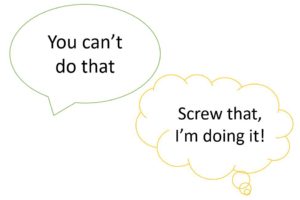 My second example is only slightly different, in that I hadn’t thought about home ownership as a goal at all. I was about to give up my apartment to move to another place with someone when circumstances changed and obstinacy kicked in again.
My second example is only slightly different, in that I hadn’t thought about home ownership as a goal at all. I was about to give up my apartment to move to another place with someone when circumstances changed and obstinacy kicked in again.
I decided I would make housing plans on my own and buy a place instead of renting. I made a budget in excel, put as much as I could into the down payment and fees, and then I owned a home.
I didn’t need to learn to use rejection and setbacks as motivation but I think it should be taught. I hear too many stories from older writers and artists who put down their pens when they were young adults because somebody told them they weren’t talented. It seems like it would be a very useful lesson plan to prepare kids for when they are told no, they can’t, they aren’t good enough, to muster a “screw you” attitude and pursue their art anyway.
Another skill that I wish I had been taught in school is how to channel disappointment into something useful. I get depressed by civic issues of inequity and discrimination and need more than the grade school equivalent of a lemonade stand that raises money for these causes. My stabs at educating myself, speaking up, and seeking out groups to participate in seem the right steps for now, but I was floundering for a long time.
The lemonade stand fundraiser is great to show little kids that they can take initiative and tangibly provide support for causes. But then the cups are put away, the money is donated, and life goes on. What’s missing is sustained effort, and follow-up to see what impact was made. An analysis to determine what about the effort was successful and what can be done to improve. Or how to translate lessons learned into the next effort.
Some of my good friends share this sense of civic-work malaise. We have a sense of being pushed to put our skills and experience to better use. Even people who are working in non-profits or who are on the board of multiple civic groups are unsettled and feel there is more they should be doing. There is a limit to how many action committees a person can reasonably join, so it seems failure to achieve the desired impact is the problem. We’re falling short of our big dreams to make a big impact.
Wouldn’t it be great if we were taught throughout school how to be patient and sustain efforts over a long period of time, even when we don’t see the results we want? I remember being taught about Abe Lincoln’s personal and professional setbacks before he became president. He had business debts that took years to pay off, was a self-taught lawyer, and lost his first attempt to win an Illinois state legislative position.
What isn’t clear is what motivated him to keep pursuing his dreams.
I wonder if he was driven by a belief that he had something to offer people. Maybe he resolved to keep trying, and to look for ways to use his abilities to be of service.
What we do know is that he said yes to opportunities. Clearly he didn’t let fear of failure prevent him from going into business, becoming an attorney, or running for public office. After each misstep, he came back with resilience. Whatever doubts he might have had about his abilities to perform in those professions didn’t stop him from showing up and doing his work.
I didn’t learn these things in school, although I wish I had.
I’ll keep using obstinacy as fuel when people tell me I can’t do something I want to do. I’ll try to be patient with setbacks and keep ahold of my belief that I have something to offer, even when I don’t see progress.
You too, ok? When someone tells you no, go ahead and prove them wrong.
And keep the faith. You’ve got something to offer.
Remembering What Was Good About A Bad Job
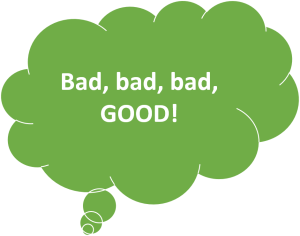 Last weekend I spent time with a friend that I met when I was at a not-so-favorite job. Let’s just say that particular job had many challenges. And not the exhilarating kind that lead to career success and personal fulfillment.
Last weekend I spent time with a friend that I met when I was at a not-so-favorite job. Let’s just say that particular job had many challenges. And not the exhilarating kind that lead to career success and personal fulfillment.
I hadn’t seen this friend in a long time and it popped into my head that her friendship was one of the best things I got from that job. We had a lot of fun while we helped each other cope.
That made me want to remember the other positive outcomes that came from a difficult work experience. Here are a few:
- I am passionate about the projects I managed and am proud of what I accomplished.
- I got to explore two specific types of marketing that I was less familiar with. I built solid skills in those areas that gave me the necessary qualifications for future work.
- I formed friendships and trusted relationships with colleagues that are still important to me.
These benefits are obvious to me, and I acknowledge them when they impact me. When I thought about it more I realized there are less obvious and more personal benefits:
- I learned what my boundaries are and sharpened the line between what I am and am not willing to do to succeed in business.
- I finally accepted that business isn’t always fair. Accepting this killed some of my idealism. However, it affirmed the type of businessperson I am and made it easier to detach from the fairness of an outcome that is not in my control.
- I changed my definition of success. Climbing the corporate ladder is only one way of evaluating success. There are many different ways to be successful in business – not to mention in life.
It takes time to recover after leaving a negative job, just as it does when leaving any significant relationship that was painful. If you’re recently out of a tough work situation I hope that you allow yourself to be angry about what wasn’t right and grieve for the hopes you had for that role.
Eventually, I hope you will also remember what you gained.

Free Your Identity From Your Job
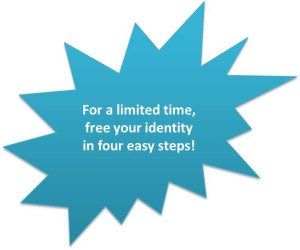 It is easy to let your job become your identity. Especially if you have a title or function that is considered high-status, or you work for a well-known organization. This manifests as “I’m important because I’m Senior Director of Finance!” or “I’m important because I’m a surgeon!” or “I’m important because my company is a nationally broadcast news station!”
It is easy to let your job become your identity. Especially if you have a title or function that is considered high-status, or you work for a well-known organization. This manifests as “I’m important because I’m Senior Director of Finance!” or “I’m important because I’m a surgeon!” or “I’m important because my company is a nationally broadcast news station!”
American culture and language may be partly to blame for over-identification with work. For example, in French, a guy doesn’t say “I am hungry” because he isn’t the embodiment of hunger. Instead, he says, “J’ai faim”, which more literally translates to “I have hunger.” Wouldn’t it be great if instead of “I am a mechanical engineer”, people thought of their job in terms of “I do mechanical engineering work for a living?”
There would be less annoying egos to deal with and more focus on producing the outcomes that job functions are intended to produce. Haven’t we all been to a party where people ask each other what they do for work and someone puffs out his chest and says “I’m the head of the ______ corporation,” and we think to ourselves, “you might be the head of a company but you’re an ass at this party.”
If you’re taking your identity from work, here are four steps to break free:
Step 1) Stop, just stop using your work email address for your personal correspondence. Using “me@mycompany” for personal use reinforces to you and everyone you email that you are inseparable from your job. I will reblog this point until you stop.
Step 2) Acknowledge to yourself that you are not your job. You are a person who does work in exchange for a paycheck. No matter what title you have, whether you work for yourself or someone else, regardless of your salary and how much or little your role is favored by society; you are still not your job.
When interviewing people about quitting their jobs, many men told me they took their identity from their work. Women often told me they think of themselves first as a mother or wife and then in terms of their work. I dislike all of this because it is taking on identities from factors outside of yourself. If you are your job, what are you when the job goes away? If your reason for existing is your child or spouse, what happens when they turn on you or disappoint you, or you end up living vicariously through them?
You can still be an employee/parent/spouse and be happy and proud of being those things. I hope you are! That is different from getting your sense of self from them.
Step 3) Start defining yourself by your own qualities and attributes. Then repeat the words to yourself, silently or aloud, every single day, until you believe it. For example, “I am a kind, generous person” or “I am strong and resilient”. Your job can’t take your innate characteristics way from you.
Step 4) Have a life outside of work. Spend time with people other than your coworkers. Have a hobby. Participate in a club or organized group. Yes, you spend many of your waking hours at work. Maybe too many. It is said you can tell a person’s priorities by how they spend their time and money. Make your life bigger than your job by caring and participating in activities that have nothing to do with work.
If you need to spend more hours working each week than on any other single activity, you can make your reason for working have more meaning. You’re supporting a family with your salary. You’re learning a skill that will allow you to transition to a better job. You’re saving money so that you will have more choices about work in the future.
And then? Do step number one right now and the repeat steps two through four until you identify yourself by your unique qualities or you die, whichever comes first. C’est tout.
I want to quit my job…two years from now
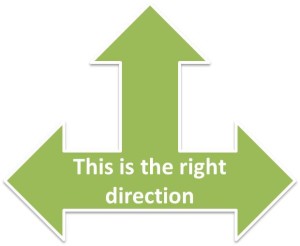 I’ve had a lot of conversations with people who tell me they want to quit their jobs, but not right now. They want to quit in two years. The most common reason is that people want to stop doing their current work and do something else…but they don’t know what that is. For some reason they think that in two years they will have figured that out.
I’ve had a lot of conversations with people who tell me they want to quit their jobs, but not right now. They want to quit in two years. The most common reason is that people want to stop doing their current work and do something else…but they don’t know what that is. For some reason they think that in two years they will have figured that out.
However, when you’re working a ton of hours in a stressful position, you don’t have much mental space or energy to determine what your next best job is. Plus, your free time is spent recovering or distracting yourself from your unhappy situation.
I feel your pain.
It wasn’t until I made up my mind that I was going to quit my job that I began to have ideas about what my future might look like. There was a definitive moment, a changing of my mindset, when I set my intention to quit. I turned my focus away from trying to make my current job situation better and focused on creating a better life. Like magic, I started getting inspired and followed my interests as far as they would go.
Here are a few examples of the actions I took and what they led to:
- After eight years without any creative writing, I started filling notebooks again. The ideas for stories, poems and lyrics popped into my head without even trying. I decided that after I quit my job I would spend a month at Naropa University’s Summer Writing Program. Once there, I wrote the outline for my self-help book for people who want to quit their jobs. I started this blog. I also kept writing creatively, joined writing groups, and volunteered with a literary magazine.
- I began researching and visiting animal sanctuaries. I documented their best practices and what they needed to improve. I have no idea if this will lead to any paid work in my future, but it was meaningful to me. The current outcome is that I have three favorite animal non-profits: Best Friends Animal Society, Chimpanzee Sanctuary Northwest and The Wild Animal Sanctuary.
- I realized that my love of research, analysis, report-writing and justice could lead to a career in private investigation. I got certified, built a marketing plan and decided this would be my next job. In case you haven’t been following my blog – I did not become a P.I. But planning to be a P.I. gave me the courage to quit my job and continue pursuing my interests until I ultimately began my consulting business.
Which leads me to this point: you don’t have to figure out your next job right now. All you have to do is follow your interests. Two years from now, your ideal job may be completely different – and better – than anything you can dream of now.
Happily, I’m not a data point of one. Many people who I spoke with followed a winding path to a satisfying career. If you need more convincing, read Martha Beck’s Finding Your Way in a Wild New World.
If you’re convinced but are thinking “what do I do now, I don’t even know what I’m interested in”, just experiment with one small, easy thing that you will enjoy doing. Make something with your hands. Revisit an old hobby. Do something you liked doing as a kid. Talk to a friend in a career that you may be interested in. Take a class or an evening workshop in a subject you are curious about. Read.
If you’re on the right track, more and more opportunities will open up to you, just as starting to write poetry again led to a month of writing classes and my book-in-progress.
When you’re not on the right track, you’ll lose interest or life will throw signs at you that it is time to change direction. For example, as I neared the date when I planned to quit my job, I began to doubt that a formal career in investigation was the right choice even though I enjoyed the process leading up to it. At the same time, a former coworker and I came up with a business idea and created an LLC in a blink. Several months later I realized our company wasn’t going to generate a salary and I moved onto my backup plan of consulting, which turned out to be a perfect career for me.
I didn’t cling to my initial idea out of stubbornness or misplaced determination. I was open to each new opportunity and was willing to move forward or change my plans as I went along. I like the metaphor of walking on a path with a lantern that only illuminates the step you’re at and where to place your feet next.
For example, if you are interested in making elaborate, one-of-a kind cakes, you don’t have to buy a bakery or launch a catering business. Have a friend or two commission desserts from you and if you enjoy it, do more. You might find that you only want to bake cakes for your loved one’s birthdays because it is a creative outlet and you feed off of their gratitude. Maybe you’ll realize you don’t want to make cakes for strangers, you don’t want to bake at all in the summer, and you really don’t want to produce a customer’s requested design if it isn’t a style you’re interested in.
When you pay attention, the universe will give you nudges in the right direction. What matters is that you are taking action. You are signaling that you are open to discovering a new path, one step at a time. If it leads you to another step forward– great! If you dislike it, or the choice generates negative results, then pursue your other interests.
If you’re one of those people who want to quit their jobs in two years, be clear about your intention. Then take one small action and you’re on your way.
Some Career Transitions Take Longer Than Others
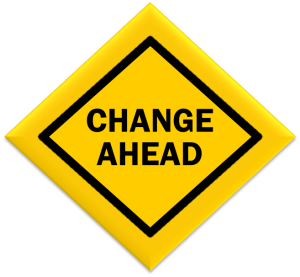 Some career transitions take longer than others. Leaving a project management role at one company for another may be a matter of updating your LinkedIn profile, and making connections with recruiters, and performing well in interviews.
Some career transitions take longer than others. Leaving a project management role at one company for another may be a matter of updating your LinkedIn profile, and making connections with recruiters, and performing well in interviews.
Wholesale career changes might take longer. Not much longer if you’ve got transferable skills, are allied with an influential person at the place you want to work, launch your own enterprise or are just plain lucky.
It takes longer if your new career path requires going back to school for training or degrees, or means taking an entry-level job to gain experience in an unfamiliar field. But time is relative and two or three years of learning the ropes at a low-paying, low-stress, starter position might be the perfect transition between a job you hated and a new career that you’ll love for the rest of your working years.
I worked with a guy who transitioned from a six-figure sales job into a lower paid marketing role to build a career with more opportunities. He is savvy and worked hard, and six years later I bet he’s earning more than he did in sales and enjoying his life much better. Another friend moved from a lucrative engineering role to finance because it gives him the experience and credibility he needs for his next career move.
If you dream of a different career but are afraid that it will take too long or cost too much to get there, remember that you can start building the skills you need right now, before you quit. Take a night class. Volunteer in a related field. Go to events focused on your career topic and network. Ask people already in the roles you want to give you thirty minutes for an informational interview, where you ask them what skills and experience are needed to get started, what they actually do each day, and whether they like it or not.
I’ve done all of these things with great results. A series of informational interviews was how I learned early in my career that I wanted to focus on business, marketing and writing, and not on graphic design. I earned my MBA in five years of evening classes, and went to work each morning applying the knowledge I had just learned. I went to conferences and exchanged dozens of business cards with recruiters, executives and friendly people who I connected with. I’m still in touch with many of them.
If you’re still not convinced, read Jennifer Lesher’s blog post from May 20th, where she describes the transition from tech to airplanes. Can you feel her joy? Imagine yourself feeling the same way.
She Quit Her Teaching Job to Become a Coach, Author and…Teacher
 Many people take a winding path when they quit their jobs to do something more meaningful. I’ve written about my own journey that took a number of unexpected turns before I began my consulting business.
Many people take a winding path when they quit their jobs to do something more meaningful. I’ve written about my own journey that took a number of unexpected turns before I began my consulting business.
It might run in the family! My sister, Kristen Sutich, left her long-time job as a kindergarten teacher in the summer of 2013. She became a certified coach, starting a business that focuses on clients with grief issues and or parents of young school children.
Those areas might overlap – I know plenty of kids who give their parents grief!
While Kristen launched her coaching business, she wrote a book of tips for parents of children who are starting kindergarten. She knew that a published book would be useful in many ways: the hard copies are something tangible she can give to clients, authoring the book demonstrates her credibility as a subject-matter-expert, and it is one more way that she can reach prospective customers.
Then, just before publishing the book she decided to start teaching at a preschool near her. She was drawn to their creative approach, started as a substitute, and quickly became a staff member.
If you had asked her in July of 2013 if she thought she would be teaching preschool a year and a half later, she would have said no – she just quit her kindergarten teaching job!
Yet, by following her interests and building on her experience, Kristen now enjoys teaching preschool, giving book readings and growing her business by connecting with people who may need her coaching services. These three roles complement and add value to each other.
If you’re leaving your current employment soon or have recently started a new career path, keep an eye out for unexpected routes. Once you start putting your time and focus on what brings meaning and enjoyment to your life, you may discover opportunities that you wouldn’t have thought of before. Opportunities that lead you closer to your happiest career yet.
P.S. You can purchase The Kindergarten Toolkit for Parents on Amazon. It manages to be cute, interesting and helpful all at the same time.
Hike, Cry, Eat Pasta, Cry
I’m back from my three week tech break and feel like I was on another planet. I didn’t miss the web or social media at all. But re-entry into the regular world is disorienting.
While on my tech break, I went to Italy as part of a class I’d been taking on emotional intelligence. We stayed at an alpine village hotel in the Dolomites, where from morning to night we practiced identifying and owning our feelings, wants and stories about ourselves and other people, and then speaking those truths. Some of this was done at the hotel, and some while hiking on nearby mountain trails. When I described the class to people, I said we were going to talk about our feelings, cry, hike, cry, eat some pasta, cry. That was a fairly accurate prediction.
It was rough. And I’m used to this kind of thing – being direct, tapping into my emotions, trying to understand where other people are coming from. I’m a huge fan of the Nonviolent Communications movement and work to incorporate the NVC principles into my daily life.
But this was different. It was immersive, for one thing – over a week of focused practice and not a lot of time to process or reflect in between sessions.
We were all vulnerable and asked to be honest about our hurt feelings or anger, when in everyday life the pressures of social norms often have us disguise our emotions so as not to upset anyone. It was also triggering. Revealing uncomfortable feelings in the moment flipped open the lid where those same feelings had been hidden away in the past, when it didn’t feel safe to explore them. But when does it ever feel safe?
No doubt the experience was harder because my beloved cat has been so sick. We were in and out of kitty ER three times in the months leading up to trip, and I only felt comfortable leaving Milo because his new pet sitter is a vet tech who thought he was stable enough to hold on until I was home. There were some scary middle-of-the-night texts when he had to go back to the hospital, and a voicemail letting me know he’d been diagnosed with intestinal lymphoma.
It wasn’t all gloomy. There was great scenery, hikes, laughs and new friendships. There’s no better way to bond than sequestering 39 people in a small Italian village for a week of emotional plumbing.
Jet-lagged and sad, I didn’t do much besides sleep and laundry for the first few days back home. Re-entry into the land of the internet is taking some adjustment. I have two tendencies: connect and avoid. It’s so easy for me to go off the grid and enjoy my solitude, until suddenly I realize that I miss people. My last emotional intelligence class project is to seek a healthy middle ground.
Hike, cry, eat pasta, cry – it’s not such a bad class formula after all.
If They’re Not Cheering For You, Ignore Them
In my last few days at my old job when everyone knew I was leaving, my coworkers were great. They were glad for me, they admired my decision and many were wistful because they wished they were leaving, too.
Outside of the office, it was a different story. When I happily shared the news with friends, their responses were often negative. One pal’s reaction was “Oh no, I’m sorry.” And then, “Why did you do that?” This was a guy who had listened to me complain for years about how exhausted I was from working all the time, who knew that I wanted something better for my life.
They weren’t trying to be mean; they just didn’t understand why I would leave a steady job to go write for a month and launch a business. They were a little concerned about the risk I was taking but mostly they were reflecting their own fear.
They were unhappy in their careers but afraid to make changes. They projected their worries about what would happen if they didn’t have regular jobs. The uncertainty was too scary.
I was disappointed that these friends didn’t celebrate with me, but I understood why. I also understood that I didn’t have to listen to their doubts. The cheering section was much more fun!
I Sold My Car But Not My Dream
I sold m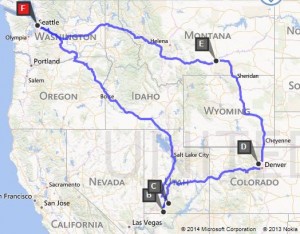 y car last week. My shiny red Dodge Challenger that showed up when I quit my job.
y car last week. My shiny red Dodge Challenger that showed up when I quit my job.
After I quit, I drove this car down Washington State and across the corners of Oregon and Idaho, and all the way down Utah where I volunteered at the Best Friends Animal Society in Kanab for a few days. Then I drove up through Bryce Canyon and into Colorado to spend a magical month as a writing student in Boulder. When the month was over, I drove up through Wyoming and across Montana and Idaho, back to my home in Washington.
Each day when I got in my car for the next leg of my road trip, I started a playlist that I made for the journey. The first song was the theme from The Dukes of Hazard. “Straightenin’ the curves/ Flatnin’ the hills”….and neither the mountain nor the law got me in that car…not a single ticket or scrape. That car was with me on the best adventure of my life.
The Challenger symbolized the freedom and empowerment I felt when I quit my corporate job. It represented doing what I wanted to do, not what anyone else thought I should do. It was about making a choice not because it was practical but because it added fun and excitement to my life.
In the book I’m writing, I do not recommend quitting your job and then buying a new car! But I had enough savings to afford it and it was an acknowledgement of the confidence I felt. I believed in myself enough to quit my regular paycheck and go out on my own, knowing that I would be fine. My attitude was about saying yes to the possibilities.
It was so much fun to drive the Challenger on freeways and the open roads across the West. It was les s fun to drive in the cramped streets of Seattle, or to navigate around tight corners in parking garages. Challengers are wide cars with long hoods. This car didn’t fit in my garage at home and stayed in the driveway.
s fun to drive in the cramped streets of Seattle, or to navigate around tight corners in parking garages. Challengers are wide cars with long hoods. This car didn’t fit in my garage at home and stayed in the driveway.
In the summer and fall it was still more fun than frustrating. My schedule was wide open and I didn’t drive anywhere on most days. When I did, I could take extra time to find parking spots. Then I started a new consulting gig in January and suddenly needed to be at an office most mornings.
With the winter weather, I had to defrost the car to drive it to the office while my all wheel drive Subaru with its heated seats and rear windshield wipers was blocked behind it in the garage. I kept the Subaru when I bought the Challenger, expecting that it was going to be temporary. I didn’t like owning two cars; it clashed with my values of living more simply and with less consumption.
When the downsides outweighed the positive, I went to the AutoTrader website to evaluate how much the car was worth and found an option to get a price quote from local dealers who buy used cars. I plugged in the details and got an offer that was $900 less than what I purchased the car for back in June. I could take it to the dealership and skip the hassle of placing an ad, meeting people for test drives, and negotiating. It was so simple that I took it as a sign that it was time to let the Challenger go.
Last week I said good bye to the car. I felt like I was taking a beloved pet to find a new home. I had to remind myself that my best memories were from driving the car out to Boulder and back this summer, and that the car was a symbol of living more purposefully. It wasn’t actually freedom itself. I can still make empowering choices that make my life bigger and better.
bye to the car. I felt like I was taking a beloved pet to find a new home. I had to remind myself that my best memories were from driving the car out to Boulder and back this summer, and that the car was a symbol of living more purposefully. It wasn’t actually freedom itself. I can still make empowering choices that make my life bigger and better.
That car represented leaving old crap behind to start a new life, and doing something that was impractical but fun and just for me. I’m so glad I had that experience. And I’m glad I realize I don’t have to keep the car to continue to leave old crap behind, start new adventures, and do things just because they make life more fun.
It’s Not Just Time. It’s Also Energy.
I hear this all the time and you probably do, too: “I don’t have time.” It’s often the first response or excuse we think of when we don’t want to do something or think it isn’t possible.
I grew up writing stories and poems. I enjoyed it. I majored in English in college and when I wasn’t writing essays or creative pieces for school assignments, I would also write for myself. That practice continued long after I graduated. I had notebooks and PC word docs filled with stories and ideas that I created in the evenings after work or on weekends.
But as years went by I began working longer, more stressful hours at my job and writing for fun slowed down. And then stopped. I didn’t write for eight years.
Certainly the more hours I spent working meant fewer hours left for myself, but what was worse than the lack of time was the lack of energy. I was tired in every sense: physically, mentally, emotionally, and spiritually. My free time became about recovery, not about hobbies, having fun, and spending time with people. I needed a lot of sleep just to be able to get back up the next day or the next Monday and go to work again.
My mind and energy were so consumed by work that I didn’t have the brain-space for creative ideas. Then about the same time that I decided to quit my job, I started thinking of stories again and wanted to write about them.
One evening I dreamt a fully formed story that included a solid plot, and wrote it down as soon as I woke. As I got in bed another evening, I had an idea for a children’s book. I got out my notebook and started writing. Four hours later, I had the entire story on paper.
Other times a melody and a few words would appear in my mind and within minutes I had a page of lyrics with the musical notes that I guessed at.
Once I made up my mind to quit, energy flowed back into the parts of myself that had been neglected for too long. Becoming consumed by work robbed my creativity and self-expression. Unplugging from the corporate treadmill brought it back.
I was still working full days while I planned my departure, but my life-force was directed towards creating a healthy, happy, meaningful existence. The hours between work and sleep now had the potential to work on creative projects. When I shifted my priorities, my entire life shifted.



Recent Comments